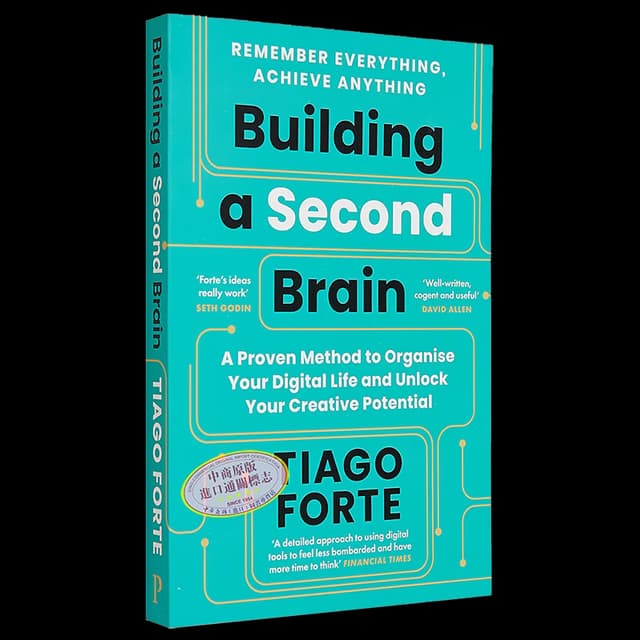
Summary
Building a Second Brain by Tiago Forte is a comprehensive guide to creating a personal knowledge management system that helps you capture, organize, and retrieve information effectively. The book introduces the PARA method and the CODE framework for building a "second brain" that extends your natural memory and thinking capabilities.
"Your second brain is a private knowledge collection designed to work the way your mind works. It's a system for capturing, organizing, and retrieving information that extends your natural memory and thinking capabilities."
The book is structured around the idea that in our information-rich world, the ability to effectively manage and retrieve knowledge is a crucial skill. Forte provides a systematic approach to building a personal knowledge management system that can enhance creativity, productivity, and learning.
Key Insights
The PARA Method
Forte introduces the PARA method for organizing information:
- Projects: Things you're actively working on with a deadline
- Areas: Ongoing responsibilities you want to maintain
- Resources: Topics you're interested in and might reference
- Archive: Inactive items from the other categories
The CODE Framework
The CODE framework provides a systematic approach to knowledge management:
- Capture: Keep what resonates with you
- Organize: Save for actionability, not organization
- Distill: Find the essence of your notes
- Express: Show your work to others
The Second Brain Concept
Forte argues that we need a "second brain" to handle the overwhelming amount of information we encounter daily. This system should be:
- External to our biological brain
- Accessible and searchable
- Organized for actionability
- Designed for creative output
Personal Reflection
This book has been instrumental in developing my approach to knowledge management and information processing. The concept of a "second brain" resonated deeply with me, especially as someone who consumes a lot of information and needs to retrieve it effectively.
The most impactful concept was the idea that we should organize information for actionability, not just for storage. This shifted my focus from creating perfect filing systems to building systems that help me take action and create value.
The PARA method has been particularly useful for organizing my digital life. It provides a simple but effective framework for categorizing and managing information across different contexts.
Key Lessons
- Organize for actionability - Information should be organized to help you take action, not just for storage
- Capture what resonates - Don't try to capture everything, focus on what genuinely interests you
- Distill the essence - Regular review and distillation helps you understand and remember information
- Express your work - Sharing your knowledge and insights creates value for others
- Build systems, not just tools - The goal is to create a systematic approach to knowledge management
Practical Applications
Since reading this book, I've implemented several strategies:
- PARA organization: Using the PARA method to organize my digital files and notes
- Regular capture: Setting up systems to capture interesting information as I encounter it
- Weekly reviews: Regular review and distillation of captured information
- Creative output: Using my knowledge management system to generate new ideas and content
- Progressive summarization: Creating multiple levels of summary for important information
Favorite Quotes
"Your second brain is not just a tool—it's a system for thinking."
"The goal is not to capture everything, but to capture what resonates with you."
"Organize for actionability, not organization."
"The best way to learn something is to teach it to someone else."
"Your second brain should be designed for creative output, not just storage."
Rating and Recommendation
I give this book a 4/5 rating. It's a comprehensive and practical guide to personal knowledge management. The frameworks are clear, the examples are relatable, and the strategies are immediately applicable.
I would highly recommend this book to anyone who:
- Struggles with information overload
- Wants to improve their learning and retention
- Seeks to enhance their creativity and productivity
- Works in knowledge-intensive fields
- Wants to build a systematic approach to personal knowledge management
The book is particularly valuable for students, researchers, writers, and anyone whose success depends on their ability to effectively manage and retrieve information.